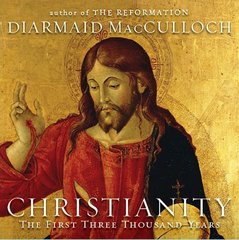
Christianity: The First Three Thousand Years
Diarmaid MacCulloch
As suggested in its title, this tome seeks to draw a straight line from the earliest history of Judaism through the birth of Jesus Christ and then the subsequent development of Christianity all the way through the U.S. evangelical support for the election of George W. Bush.
In fact, it goes further back than that. Diarmaid MacCulloch, a historian at Oxford, tries to trace Christianity’s origins as far back as humanity’s first efforts to impose a narrative on human progress.
So he argues that Israel and Greece are as important for understanding Christianity as are the teachings attribute to Jesus.
The history is clear and illuminating as it covers how events unfolded from the time in which Homer’s epics became the charter documents of Greek civilization to the lifetime of Paul of Tarsus, and when Christianity became something other than a branch of Jewish belief.
This works for me, the reader, as far as the Council of Chalcedon, but then it starts to be harder to follow.
Trying to tell one story about the development of the different branches of Christianity over the next 1,500 years may be possible, but it involves jumping back and forth hundreds of years to cover, for instance, the development of the Ethiopian church and then go back and explain what was happening between Orthodoxy and Catholicism in Poland over the same time span.
I picked up a lot of interesting history and trivia, but I’m not sure it all makes sense as a linear progression in my mind.
In retrospect, I wish I’d read through the Council of Chalcedon, and then dropped the rest of this 1,000 page book, which it took me months and months to finish. I would have filled in the rest of the history of Christianity with different topic books, such as the author’s The Reformation: A History.
Partly because I’ve been reading this book so long, I’ve forgotten why I picked it up or where I got it. If you gave me this book, please let me know so I can thank you.
Diarmaid MacCulloch
As suggested in its title, this tome seeks to draw a straight line from the earliest history of Judaism through the birth of Jesus Christ and then the subsequent development of Christianity all the way through the U.S. evangelical support for the election of George W. Bush.
In fact, it goes further back than that. Diarmaid MacCulloch, a historian at Oxford, tries to trace Christianity’s origins as far back as humanity’s first efforts to impose a narrative on human progress.
So he argues that Israel and Greece are as important for understanding Christianity as are the teachings attribute to Jesus.
The history is clear and illuminating as it covers how events unfolded from the time in which Homer’s epics became the charter documents of Greek civilization to the lifetime of Paul of Tarsus, and when Christianity became something other than a branch of Jewish belief.
This works for me, the reader, as far as the Council of Chalcedon, but then it starts to be harder to follow.
Trying to tell one story about the development of the different branches of Christianity over the next 1,500 years may be possible, but it involves jumping back and forth hundreds of years to cover, for instance, the development of the Ethiopian church and then go back and explain what was happening between Orthodoxy and Catholicism in Poland over the same time span.
I picked up a lot of interesting history and trivia, but I’m not sure it all makes sense as a linear progression in my mind.
In retrospect, I wish I’d read through the Council of Chalcedon, and then dropped the rest of this 1,000 page book, which it took me months and months to finish. I would have filled in the rest of the history of Christianity with different topic books, such as the author’s The Reformation: A History.
Partly because I’ve been reading this book so long, I’ve forgotten why I picked it up or where I got it. If you gave me this book, please let me know so I can thank you.

